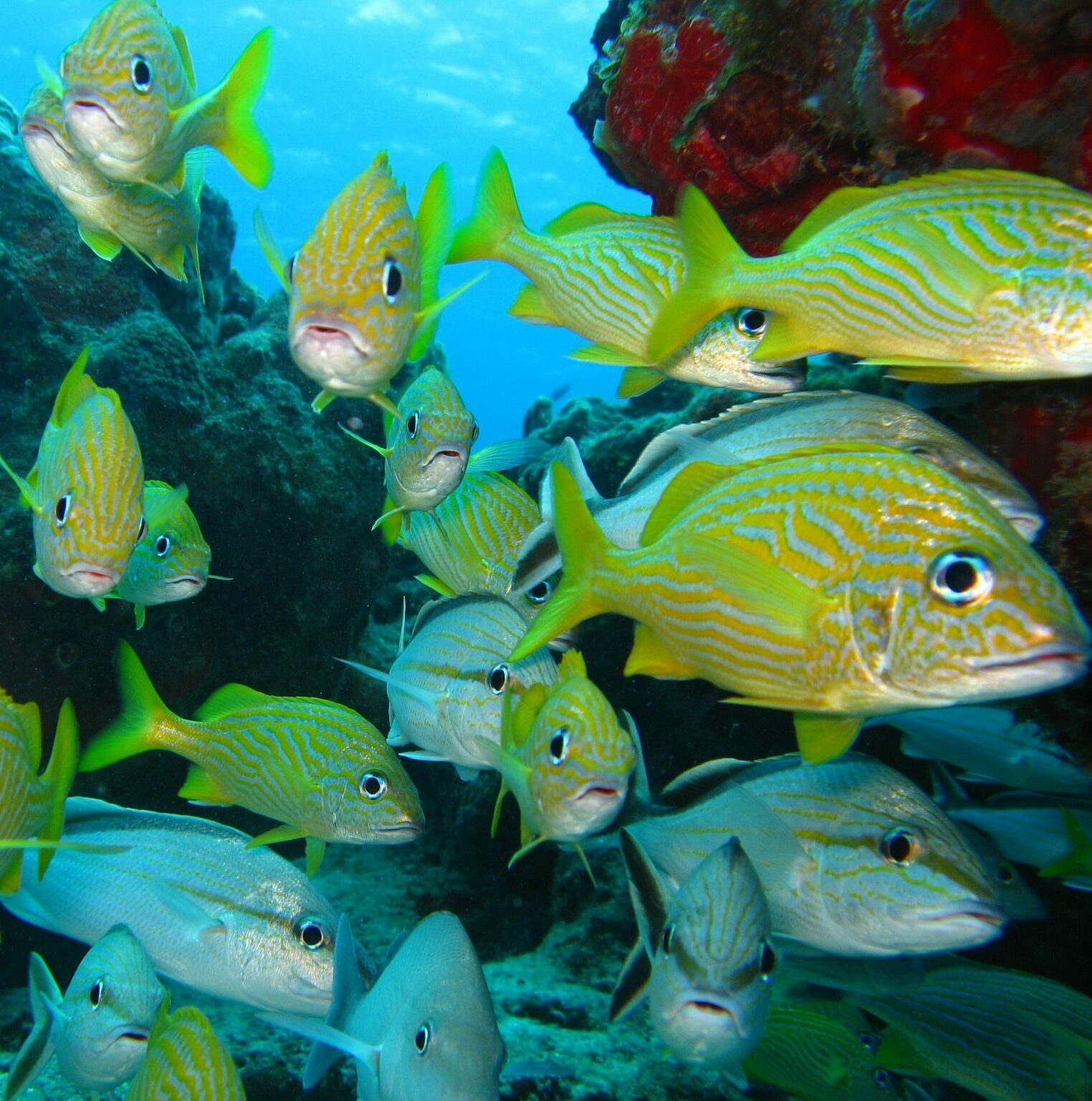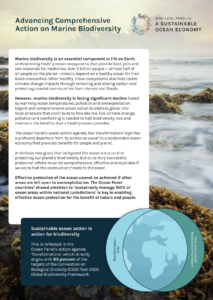Over the last three decades, biodiversity has plummeted due to human caused stressors such as pollution, development, overexploitation and climate change and the ocean is not exempt from these losses, with rapid species decline, degrading iconic landscapes like coral reefs. Urgent and comprehensive action is needed to halt biodiversity loss and restore and protect important marine ecosystems such as coral reefs, mangroves, salt marshes and mangroves to ensure their continued existence and the benefits from the myriad services these systems provide.
If managed sustainably and equitably, the ocean can help to solve some of the world’s greatest challenges. The Ocean Panel’s ocean action agenda, Transformations, supports a profound departure from ‘business as usual’, towards a sustainable ocean economy that helps to simultaneously tackle climate change and biodiversity loss, while providing benefits for people, nature and the economy.
Sustainable ocean action is action for biodiversity. The goals in the Ocean Panel’s shared agenda directly align with 85% of the targets of the CBD post-2020 Global Biodiversity Framework.
Read more about how the two agendas align and some examples of action taken by Ocean Panel countries.
Below, explore a selection of ocean events at COP15 that advance the goals of the Post-2020 Global Biodiversity Framework and the Transformations agenda:
1. Marine Working Group Session
Thursday, December 8 | 20:00 | Online Session Available
Countries that make up the marine working group session of COP15 will explore the application of the Post-2020 Global Biodiversity Framework within ocean environments as well as other aspects related to securing marine biodiversity such as the status and trends of marine and coastal diversity and monitoring and implementation strategies.
2.Ecologically or Biologically Significant Marine Areas (EBSAs)–Describing the special places of the ocean in a changing world
Friday, December 9 | 13:15 |CEE Meeting Room 510A
After more than 10 years, the regional EBSA workshop process has examined around 75% of the global ocean and has yielded a portfolio of EBSAs that encompasses a wide range of species, habitats, ocean features and biogeographic provinces. This process has generated positive outcomes and co-benefits, not only describing and mapping out the special places in the ocean, but also catalysing partnerships and enhancing political attention to these areas. This side event will review new information that has emerged in various EBSAs around the world, and the implications of this for the use of EBSA information and the future of the EBSA process.
3. From Local to Global: Collaborative Efforts to Protect Marine Biodiversity in a Changing Climate
November 15 | 10:30 – 11:30am | US Pavilion
This interagency and cross-sectoral panel will highlight U.S. efforts at multiple scales to implement ocean solutions to mitigate the effects of climate change on marine biodiversity. Panelists will have the opportunity to discuss how to better enhance domestic and international efforts through collaborative partnerships, such as the United Nations Decade of Ocean Science for Sustainable Development (Ocean Decade). It will build upon the Ocean and Climate Change Dialogue 2022 by providing specific examples of ocean-climate action that can be implemented at local, regional, and global scales and share opportunities for creating and enhancing partnerships to increase global implementation and integration of ocean-climate solutions. Discussion will span across various topics, including Marine Protected Areas (MPAs), marine and coastal biodiversity, and climate change.
4. Indigenous and local communities small scale fisheries: local stewardship for the implementation of the 2030 biodiversity conservation agenda
Saturday, December 10 | 16:00 |Side-event 1 512E
For marine and freshwater conservation to be effective and comply with the objectives and mandates of the 2030 agenda and the proposed Post-2020 Global Biodiversity Framework (GBF), we need to recognise the centrality of small-scale fisheries (SSF), Indigenous peoples and local communities (IPLCs) to conservation success. The value and importance of SSF and IPLCs for food security and for conservation of marine and freshwater biodiversity is gaining increased recognition, yet, the current GBF does not reflect, respect nor sufficiently guarantee indigenous and local community SSFs human rights and stewardship. Protecting and respecting the rights of small-scale fishers and IPLCs, safeguarding traditional management, the transmission of indigenous and local knowledge and the potential of sharing nature’s benefits inclusively and equitably will be some of the main challenges for the implementation of the new GBF. At this 90-minute interactive panel, speakers will discuss the SSF Call to action in the framework of the SSF guidelines, as well as tools and practical recommendations towards effective and efficient implementation of the GBF that considers a human rights-based approach.
5. The Sustainable Ocean Initiative: 10 years of building capacity and catalysing partnerships to achieve global ocean goals
Tuesday, December 13| 13:15 |CEE Meeting Room 510A
The Sustainable Ocean Initiative (SOI) is a capacity-building programme, developed by the CBD in 2010, to provide support, advice, and guidance to countries in their efforts to achieve global biodiversity targets in marine and coastal areas. This programme facilitates dialogue and coordination between countries and organisations, it catalyses partnerships, and builds on lessons learned. From the SOI Global Dialogue with Regional Seas Organisations and Regional Fishery Bodies to the SOI Training of Trainers programme, the various SOI activities aim to achieve a balance between the conservation and sustainable use of marine and coastal biodiversity, at global, regional, national, and local levels.
6. Translating the Post-2020 Global Biodiversity Framework for Marine and Coastal Biodiversity
Tuesday, December 13 | 15:00 – 16:00 | Nature Pavilion
This event will outline the path to implementation, focusing on showcasing efforts and mechanisms to support the restoration of coral reefs to sustainable financing for the effective conservation, protection and restoration of coral reefs. Following welcoming remarks, the session will support a panel discussion highlighting key considerations for countries, demonstrating a unified coral community ready to act, and support and the implementation of the Post-2020 GBF.
7. Coordinated support from UN-Oceans for the implementation of the Post-2020 Global Biodiversity Framework
Tuesday, December 13 | 18:15 | Business and Industry Organizations Meeting Room 514A
In this landmark year for the ocean, ocean action has been advancing on multiple fronts. The 2022 UN Ocean Conference held in Lisbon generated hundreds of new voluntary commitments and a political declaration aimed at scaling up ocean action based on science and innovation for the implementation of Sustainable Development Goal 14. This UN-Oceans side event will provide an opportunity for UN-Oceans members to: highlight their respective potential roles in, and contribution to, the implementation of the post-2020 global biodiversity framework, with a particular focus on ocean issues; discuss ways to strengthen and promote coordination and coherence of UN system activities in support of the implementation of the Post-2020 Global Biodiversity Framework; and share insights on ways in which the Post-2020 Framework can serve as a catalyst for greater synergies to advance ocean action and achieve internationally agreed goals.
8. Innovating the Global Collaborative Framework Underpinning Biodiversity Knowledge in the Deep Ocean
Thursday, December 15th | 13:15 |Contact Group 5 516C
Since the late 1970’s, environmental studies undertaken along with mineral exploration activities in the international seabed area (the Area) have resulted in remarkable gains in knowledge of deep-sea biodiversity. Consequently, large numbers of biological specimens have been observed and sampled from these Areas, with over 45,000 occurrence records compiled in International Seabed Authority (ISA) DeepData database. DeepData is the public data and information repository relating to the marine environment and the resources of the Area’s data, submitted by ISA contractors. Data hosted in DeepData include biological, physical, chemical and geological parameters of the marine ecosystems, contributing to a comprehensive understanding of biodiversity at the seabed and in the water column. This event will introduce the latest proposed implementation plan of Sustainable Seabed Knowledge Initiative (SSKI) to the international community, including the progress in building an advanced global network for generating, standardizing, and sharing deep-sea biodiversity data to identify potential additional actions and objectives.
9. An Ocean of Life: Knowledge and Solutions for Marine and Coastal Biodiversity under the Post-2020 Global Biodiversity Framework
Friday, December 16 | 08:30 – 13:00 | Rio Conventions Pavilion, Blue Zone
This event will explore the challenges and opportunities to move from knowledge to action in marine and coastal ecosystems in the context of the post-2020 Framework. It will bring together high level speakers from government, science, industry, and philanthropy to explore the data, infrastructure and knowledge needs of different user groups to inform policy and decision making and showcase global solutions for conserving and restoring marine biodiversity in a changing climate. The event will also launch a major new publication highlighting the role of the UN Decade of Ocean Science for Sustainable Development in achieving the ambitions of the post-2020 Framework.
Andrew Rhodes of Mexico and Minister Espen Barth Eide of Norway will be featured at this event representing the Ocean Panel.
10. I’s on the Ocean: Integration, Implementation, Impact
Friday, December 16 | 18:15 | IGOs Meeting Room | 514B
To strengthen ocean impact, we must align efforts and ensure the integration of ocean action across biodiversity, climate, and sustainability agendas. Implementation: This event will convene leaders across the public, private, scientific and civil society arenas to “chart a course” from commitment to delivery and call upon the broader ocean community to work more closely together to secure and deliver the GBF. Impact: Event speakers will highlight examples and the actions and enabling conditions necessary to accelerate area-based conservation and effective, inclusive community-based management, to inspire renewed action, investment and commitment to deliver the GBF and real impact. This event is envisioned to be ‘part-two’ of the event Marco Lambertini and Elizabeth Maruma-Mrema co-hosted at the UN Ocean Conference in Lisbon.


 Previous
Previous



